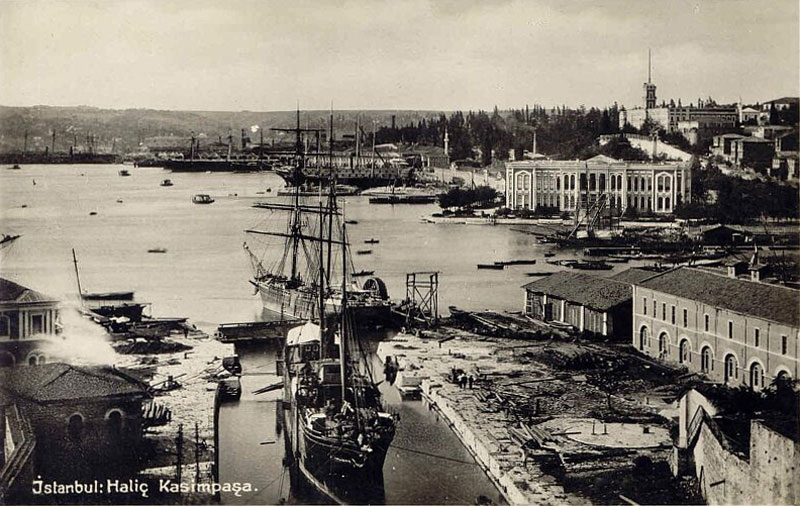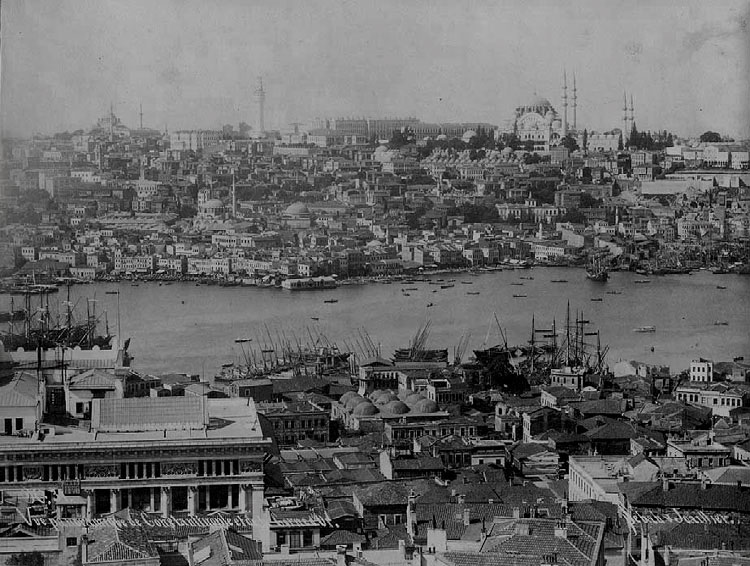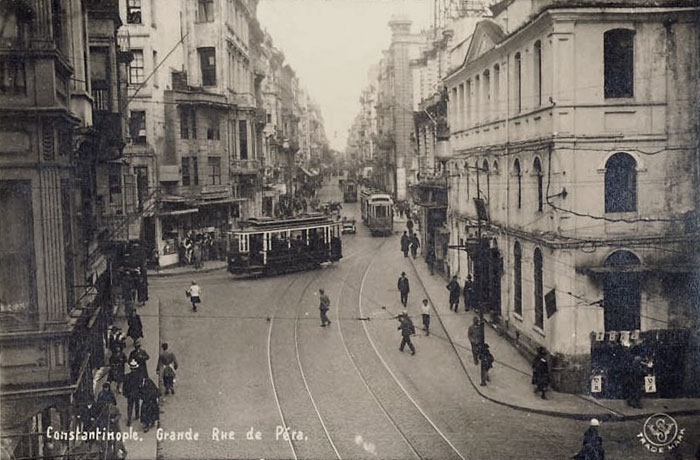
The Interviewees
Herve Georgelin | Pelin Böke | Alex Baltazzi | Axel Corlu | Philip Mansel | Antony Wynn | Fortunato Maresia | Vjeran Kursar | Christine Lindner | Frank Castiglione | Clifford Endres | Zeynep Cebeci Suvari | Sadık Uşaklıgil | İlhan Pınar | Ümit Eser | Bugra Poyraz | Oğuz Aydemir

Interview with Philip Mansel, on his book ‘Constantinople: City of World’s Desire, 1453-1924’
1- When did you first take an interest in Constantinople and the Ottoman Empire. How long did you research the subject for?
I always liked the Byzantine Empire as a boy. I first took an interest in the Ottoman Empire when I started going every year to Istanbul in 1982. It linked in with my interest in the history of European monarchies histories since I realised the basic unifying factor of the buildings and history of Istanbul was the Ottoman dynasty, also I was fascinated by the questions ‘why did the Empire last so long, and how did so many different races live together?’ I first did a book of old photographs of the Ottoman dynasty and its neighbours ‘Sultans in Splendour’ which came out in 1988. I had been researching that for 2 or 3 years and I feel I only touched the tip of the iceberg. There have been many fantastic books of Ottoman photographs since then. Then I began researching Constantinople in about 1990. I had a wonderful time sitting alone in the library of Istanbul by Aya Sophia, founded by the great Çelik Gülersoy.
2- Why did you choose to start the period of examination with the Ottoman conquest of the city? Do you consider the Byzantine legacy was mostly erased with the conquest, making it less relevant?
Yes I do think the Byzantine legacy was mostly erased. But there may be research in the trade guilds that may show more links.
3- The efficient Ottoman administration of Constantinople, straight after the conquest onwards, clearly based on an ordered system of delegation, record keeping and steady revenue is remarkable for a people whose origins were nomadic. Do you think the far-sightedness of the rulers were the paramount factor or did they benefit or even use the relict of Byzantine know-how and infrastructure?
The Ottomans had already created an efficient system in Edirne and going back even their Seljuk forebears, so I don’t think the Byzantine system relict had anything to do with it.
4- The ‘vakıf’ system of benevolent foundations based on major mosques of the city were clearly influential in alleviating poverty and suffering through their attached hospitals and soup kitchens. Do you think this led to internal calm in the multi-ethnic city, allowing the state to flourish.
I don’t know what proportion of the population was reached by soup kitchens etc. and I think it was a small proportion. There was also a system of state subsidies for food, and the state effectively drained places like Romania and Egypt for food and so the conditions in the capital were never akin to that of say Paris in 1789, as far as we know.
5- Do you think Sultan Mehmet the Conqueror was bestowed with extraordinary qualities to succeed in the capture of Constantinople where so many others before had failed or was he fortunate to be in the period when the Byzantines were particularly weak?
Yes, the Byzantines were weak, but he was also a political genius, one of the most remarkable of all Sultans. And one with the most enquiring mind.
6- The Ottoman Empire seems to have pursued a novel though potentially high risk strategy in recruiting viziers and pashas from the ranks of Christian slaves, thus partly creating a classless society where advancement was based on achievement. This system clearly worked till the dissolution of the Janissaries, but ignoring this bloodbath, do you think the Ottomans consciously strove to socially engineer with constant new blood the perfect palace and army corps or do you think the primary motivation was for the Sultan to deal with his over-riding concern to circumvent the power of the established ethnic Turkish beys.
Yes, I think the latter. I think they had the science of management through race differences. Some contemporary chroniclers have said this, also it was a tradition in the Islamic world since the Caliphs imported Turkish guards in the 9th century. Tensions between Arabs and Turks have been going on for over a 1,000 years. Race awareness was extremely common in the Ottoman Empire until its fall.
7- Do you think there are fundamental differences in the expansionist policy of the Ottoman Empire versus the Western European powers? The modern popular consensus in Turkey seems to be one of a benevolent occupation, quite unlike European colonial powers, thus liberating them from their own petty kingdoms and providing full liberties of religion and way of life. Do you think this is a bit too generous when looked at from both sides?
Yes, it is much too generous. Gibbon said ‘the history of Empires is the history of human misery’. There were pyramids of skulls on the plains of Serbia after the first battle of Kosovo and other occasions. On the other hand, at its best the Ottoman Empire could enable different groups to retain a certain autonomy and even to progress economically. When the Russian army invaded Bulgaria in 1877 it found Bulgarian peasants much better off than Russians. Many Greeks left newly independent Greece for the riches of Smyrna.
8- Do you think the Ottoman Empire was right to provide the extra-territorial privileges (capitulations) to Westerners over 300 years, helping to build up a rich mercantile class in many of its port cities, including Constantinople. Do you think the benefits this Levantine community provided outweighed the drawbacks, such as the creation of trading cartels the indigenous populations found hard or impossible to penetrate?
It is the million dollar question that requires more research. If the Empire did not benefit from the system it would not have been started and maintained. Clearly it got out of control by 1880. The Levantines did kick start the Ottoman economy in some regions. Smyrna had the Empire’s first railway, electricity and motor cars.
9- Do any of the dragoman or mercantile Levantine families / persons really stand out for you in terms of their own achievements or contribution to the standing of the Ottoman Empire, or other facets?
I think the De Testa are fascinating because they are so old, dating from before the conquest and served so many different countries as dragomans, France, Austria, Germany and others. It was a De Testa who published the first collection of Ottoman diplomatic documents from the 1870s.
10- During the 19th century there were a series of reforms of the state, military and civil rights. Do you think the impetus for this was more intrinsic or extrinsic, foreign powers wishing to create an Empire able to stand up to the Russian expansionist policy?
Both, we cannot deny the British and French involvements and diplomatic pressures. There were also some very clever Pashas who decided to try reforms on their own initiative as a means of strengthening the state.
11- Towards the end of the book you note: ‘Cairo, whose population rose from 374,000 in 1882 to 1,312,000 in 1937, replaced it as the largest city in the Middle East and the focus of the Arab world. However much they loved Istanbul, most Arabs returned to their homelands. Like Greeks and Bulgarians in the nineteenth century, they found that the City was not enough.’ Can you explain this sense of the city no longer holding the lure to these populations post Ottoman period?
Yes, the best schools were in Istanbul before 1918. Istanbul also had to the Ottoman government and parliament and the ideal climate for summer holidays. Iraqis regarded it as a Mecca. After 1918 it was no longer the capital city for any Arabs. Nevertheless some continued to spend summers there. It was on a yali on the Bosphorus for example that the young Faisal II of Iraq met his fiancée (Egyptian Turkish princess), one year before his murder in 1958.
12- If you wrote a sequel to this book what would you add or amend?
I would add more quotations from Turkish poets and novelists and more on the precise circumstances of the diminution of the Greeks and other communities, concentrating on the events of 1943, 1955, 1960s.
13- If you wrote another book which city would it be and why?
I would like to write another book on Paris, possibly the English people in Paris, from Anne Boleyn to Nancy Mitford. Lots of books on cities need to be written, for example a good history of Naples.
14- What books would you recommend on the Ottoman Empire?
I particularly like in Ottoman history the works of Caroline Finkel ‘Osman’s Dream’, Edhem Eldem ‘The Ottoman City between East and West: Aleppo, Izmir, and Istanbul (Cambridge Studies in Islamic Civilization)’ and the many commemorative volumes that appeared to mark the 100th anniversary of the young Turk revolution in 1909. The Young Turk period is still under-studied and little understood.
15- Do you think Turkey is potentially on the cusp of a great economic leap forward, based on steady progress and opportunities with the recent Arab Spring.
I think Turkey has a great future as it also appeared to in 1908. But the forces of nationalism and militarism and reaction are always there to pull it down.
Interview conducted by Craig Encer, June 2011.
Click to read the transcript of the interview with Philip Mansel concerning his later book ‘Levant: Splendour and Catastrphe on the Mediterranean’.
Interview with Philip Mansel, on his book ‘Sultans in Splendour: Monarchs of the Middle East 1869-1945’
Some decorative images of Constantinople and Smyrna pre-1922:


The Golden Horn, with the dockyards and armory beyond

Baker standing in front of the ‘American Bakery’ which displays signs in Armenian, Ladino (in Hebrew characters), English, Ottoman Turkish, Greek and Russian with samples of bread attached for the needy, Ortaköy, Istanbul, Turkey in 1922, part of the international aid for the occupied city.

The Golden Horn, looking from the heights of Galata to the old walled city of Constantinople beyond

